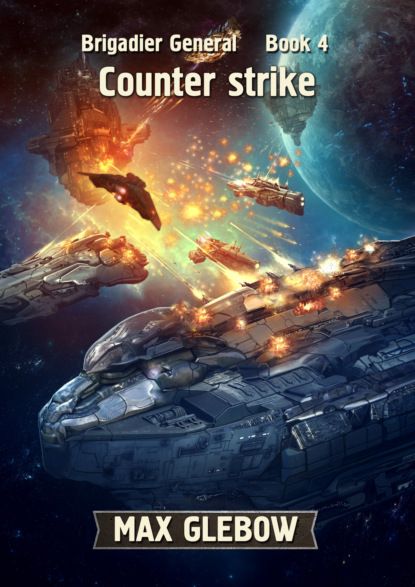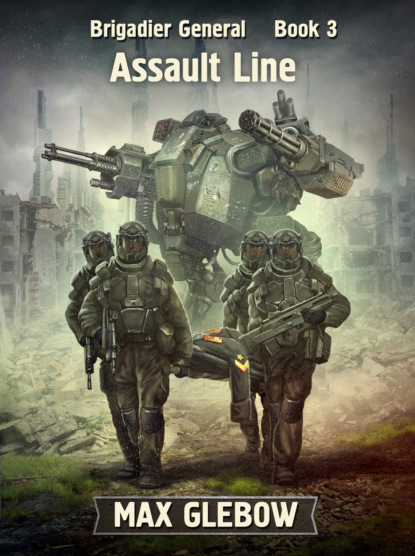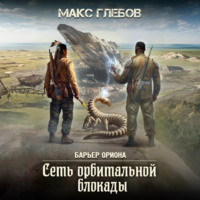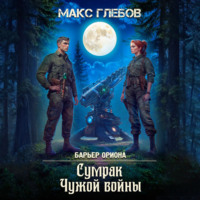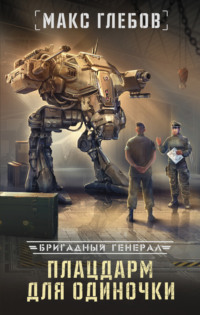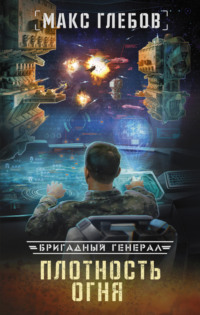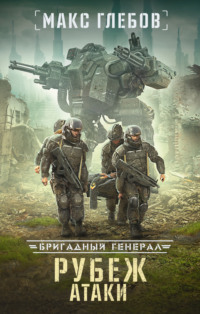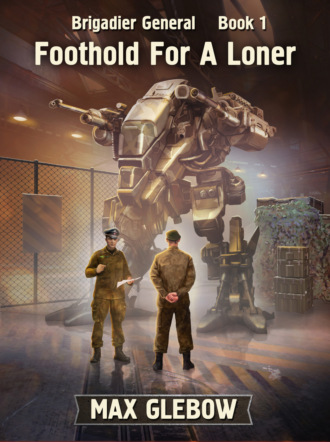
Полная версия
Foothold For A Loner
“I’m the pilot, Major.”
“You? Eh… I beg your pardon, General, Sir, that’s probably not my business, but it’s very unusual. In my many years I’ve never seen a brigadier general in command of a platoon of assault robots… Not even a colonel, not to sound too…”
“Just relax, Major. There's a first time for everything,” I smiled. “Just get them prepared, and I won’t inconvenience you any more with my presence.”
“We’ll do that in a jiffy, rest assured, General, Sir. Probably four hours, tops. I've already called the guys to the 16th hangar. I’ll oversee everything personally.”
“I have no doubt, Major. No doubt.”
Delta Kirsani greeted me with the commotion following a major battle that had ended. The toads had dug in very well here. Everybody calls them ‘toads’. Our enemies have another name, an official one, but after seeing these oversized frogs at least once you could only call them ‘toads.’ They’re just toads.
Within a year after our fleet had left this binary star system the toads gained a foothold on all three planets that supported life, deployed orbital defense systems and built many bases within the asteroid belt. That's not to mention numerous minefields and automatic gun-missile platforms at the most strategic directions. Also, a fleet was stationed here. How could they manage without it? Orbital fortresses alone can’t provide flexibility for a proper defense.
Our side took this matter seriously, and I can’t even imagine how many star systems were deprived of additional forces in order to build this invasion armada. No less than 10 aircraft carriers, 14 battleships, nearly 100 cruisers, as well as a host of destroyers and corvettes. All this power came pounding down on the toads, and after busting through the mines and pilotless battle stations they hit the orbital fortresses over the fourth planet. No orbital defense could withstand such an assault. The toads’ mobile forces did their best to hold onto their battle positions above the planet, plugging holes created by destroyed fortresses, but that didn’t last long. Once our fleet had finished off the enemy orbiting the system’s main planet, it proceeded to the neighboring planets and by now there were no enemies left in the space.
That was a glorious victory but a very bloody and costly one. You couldn’t look at the victorious ships without choking up: pierced boards, gun turrets crushed by enormous explosions, gnarled and twisted flight decks. And these were the survivors – less than a half of the forces had arrived here. The toads are able to fight hard even outmatched, even when caught unawares…
Well, the orbital defense had been neutralized. It was now up to the commandos.
I piloted the Cuirassier myself. Essentially, this small troop transport was designed to be steered by the pilot of assault robots aboard. The Cuirassier was created for intersystem flights and for landing troops directly on a planet surface under favorable conditions. It can’t make a hyper-jump, so I arrived to this system on the outer hangar of a large troop carrier that transported heavy assault tanks. Its captain wasn’t at all happy to make a center-of-gravity recalculation before the jump and nearly told me to bug off, but then he compared his shoulder straps to those of the ballsy Cuirassier pilot and refrained from any objections.
After emerging from hyper-jump I reported to General Clay about my arrival. The first wave of commandos had already left for the fourth planet, and General Clay was too busy to say the least, but he nevertheless found the time and showed me the waiting area. The guys were clearing a foothold for a heavy equipment landing and the General ordered to be ready to join the commandos in an hour or two.
That landing order came earlier than I expected. Besides the coordinates for the landing point and short notification of safe passage, there was also Clay’s comment: “Don't you dare launch any suicidal attacks. Remember the mission. You may sacrifice all your robots but give them a chance to fight well, and so that your module has a chance to send a report to the Technological Consortium”.
In general, I understood that. When translated into normal language it means the following: “Don’t hurry your journey to the afterlife. I still need you here, at least until the mission ends. Or almost to the end.”
The landing passed without any surprises. When I landed on the surface I saw the price that the first wave paid to provide me with a smooth landing. The landing point was already cleared, but as far as the eye could see the entire area was covered with fragments of fighting vehicles, still emitting smoke. Many of the toads’ tanks were still burning, but then things got really hard for us. If things continued like this then the first wave would be drained in a couple of hours.
There was a loud rumble of powerful planetary engines. The first carriers with troops and equipment started their final approach.
On the second day I realized that we were really bogged down. Our troops couldn’t expand their foothold no matter how hard they tried. The toads unhesitatingly continued to send new forces into combat that had been hiding in well-disguised underground shelters. I managed to help stop an enemy tank breakthrough and beat back an airstrike of atmospheric attack planes. The hotshots from the Imperial Technological Consortium clearly knew their stuff.
My assault robots acted above and beyond my expectations, compared to the previous models. I only coordinated their actions while sitting in my heavily armored command module that was really a walking tank similar to my robots but almost twice as massive. My robots did a fine job with aerial targets. Flaming debris from three toad assault planes fell to the ground battered by explosions. The remaining two planes that sustained damage couldn’t provide precision fire and hurriedly retreated by hedgehopping over the nearby forest.
It was worse with the tanks. They had strong armor, as well as force shields. An assault robot is not supposed to fight tanks head-on along flat land. They’re more suitable for battle in difficult terrain, in tight conditions when it’s possible to sneak up on the enemy and go for the jugular. Nevertheless, my tiny ‘roaches’ managed to incinerate two tanks. But they paid a great price to achieve that.
No matter what, however, tank cannon is a really a wicked thing. A robot can’t survive a direct hit, and it just obliterates. Only seven of my ten robots were left, and two needed repairs. They stumbled: their scanning and navigating systems were damaged. Again I said a mental ‘Thank you’ to the development engineers for their great work. As soon as my robots were united in one battle network the damaged ones were given targets by their serviceable neighbors.
Soon, we realized that these adventures were just a prelude, a kind of delicacy to whet the appetite before the main course that the toads were going to serve without any delay. The toads waited until the main bulk of their troops had landed and then launched the operation. They hit us from where we didn’t expect it.
Terrestrial batteries with anti-orbital cannons were always considered to be desperate weaponry, a kind of last trump card to stop attacks on troops and infrastructure from enemy ships hovering over a planet. But this time the toads demonstrated that quantity can morph into quality.
From under the surface bluster cannons appeared, mushrooming like after the rain. Well camouflaged, they previously went undetected. Hundreds of lightning strikes darted into the sky, annihilating ten troop carriers that were starting their final approach using corridors considered to be secure. Our orbital group was completely shocked, and orbital support suffered a major setback. Atmospheric planes had to stop their flights. When our battleships, with their long-range cannons, moved closer in order to neutralize the terrestrial batteries the toads counterattacked. Everyone was really shocked and depressed.
But I had asked to be here for this very moment, and it was time to do my job. I indicated the motion vector to my tiny roaches and we briskly ran to the nearest enemy battery that had just appeared out of the ground.
Quickly it became clear that I had overplayed my hand. The toads today were throwing out unpleasant surprises, one after another. As soon as the anti-orbital cannons arrived they sent out a swarm of atmospheric destroyers and attack planes. Until that moment the toads spared these swift but vulnerable machines, trying hard to shield them from orbital attack, but now it was time to use them.
The battle quickly fell into separate sectors where isolated ground units tried to fight off the air forces pressing down hard. In some places it worked pretty well, but there were too many in the sky. My assault robots started to run low on ammo. Plasma guns – that’s good, but to obliterate an enemy by a guided missile is much more pleasant: the distance is greater and target accuracy is better. Only a few missiles were left, however. Two previously damaged robots were finished off rather quickly, and only five remained.
As it turned out, my small problems were nothing in comparison with what was happening in space. Almost simultaneously with the toads’ attack on the planet, their ships started to appear out of hyper-jump. First, there were just a few, the fastest ones, but before long their number was equal to that of the Empire’s ships. By and large, those higher up in headquarters quickly became aware of the kind of cesspool our invasion fleet had fallen into.
A counteroffensive could well result in a catastrophe. The Admiralty didn’t want to push the situation to the point where it would be an irreversible clusterfuck, and so the order was given for an urgent evacuation and to leave the system.
Despite all this, I wasn’t going to evacuate. For me, this was almost a perfect situation. I’d be most useful by covering the evacuating troops; that’s what I was going to do. I altered the task for my robots and started to move them to the landing point while shooting our way out and taking cover behind the smoldering remains of equipment.
The orbital force continued to hold. In just the last hour our ships in orbit considerably reduced the number of enemy terrestrial batteries that had harassed them so much, and now cannon fire from the cruisers and battleships pounded the wave of armored vehicles rolling toward the ring closing around the commandos. A continuous stream of carriers landed on the cleared ground behind the troops. People quickly embarked and loaded the most valuable equipment and headed back to orbit where they started to accelerate for a hyper-jump out of the Delta Kirsani system.
New robots were added to my platoon. When a considerably battered assault company was evacuated, only the pilots and their command modules were taken into the carrier. Their robots were handed over to me. There were only seven, but now I had more robots than before. I wouldn’t say that these new ones were equal to those I’d lost. The previous generation of robots was far inferior to the latest developments, but I had no reason to complain. I had gotten a generous refill of ammo because they didn’t need to take it with them to orbit.
Still, the toads didn’t let our commandos quit the system quietly. They regrouped their ships within the system and tried to intercept the carriers accelerating for hyper-jump. Our ships naturally rushed to defend them. A battle ensued, and soon all the big ships in the system were involved. Therefore, the remaining troops on the surface couldn’t rely anymore on support from orbit.
We felt the impact immediately. The insolent atmospheric planes pushed forward raining missiles down on us, as plasma poured from cannons. Enemy tanks started a new attack, pushing aside the debris of equipment knocked out of action. Few of us remained since the main body of troops had been evacuated. As the senior officer among those on the surface, I ordered to abandon the equipment and make a run to orbit in my Cuirassier that stood on the edge of the landing site.
They tried to make me fly with them, but I repeated with a certain pleasure some colorful figures of speech used by a sergeant at the military school where I was a cadet. All the subordinates evidently had a similar experience, so they obeyed, jumping into the Cuirassier, and with an enviable swiftness rushed into the sky.
The equipment was not just left behind but was hooked up to my command module. Thanks again to the engineers, my module was able to control this motley crew, although at first I doubted it. I now commanded almost a battalion comprised of 50 assault robots, a couple of heavy assault tanks, two launchers of short range missiles and even three armed unmanned atmospheric planes.
The toads immediately took an interest in the Cuirassier’s take-off and were about to shoot, but I didn’t let them. My motley crew made a frontal attack, imitating a breakthrough of the defensive ring. I told half of my robots to shoot down the missiles launched at the Cuirassier, and the rest they destroyed at point of launch.
My attack fizzled out almost at once, however, as was expected. After all, we were greatly outnumbered. In just 90 seconds both of my assault tanks were burning with smoky fire, only one-third of the assault robots remained. The launching racks were now a useless heap of junk since no one was left to reload and the ammo was gone. Atmospheric planes were shot down while covering the transport ships. Still, I bought the Cuirassier 90 seconds; they had a chance.
Generally speaking, I should have been dead by now. I was still alive, but I had no idea what to do next. I completed my mission but I couldn’t be evacuated. I could go on fighting, of course, but there was no point.
I continued to direct my robots while trying to find a solution. My thoughts were interrupted by a call. We had agreed with General Clay that there would be no farewells and no ritual verbiage, hence I was caught off guard by this call. Since it was the top brass, I had to respond.
“This is Brigadier General Dean, you have my full attention,” reverberated the words in an official tone in my helmet telecom system.
“Stop this fucking circus, Dean. Why the hell didn’t you answer my call? Get out of there. Now!” General Clay used approximately the same words that I’d used some ten minutes prior to convince my subordinates to board the Cuirassier.
“Well, Clay,” I responded tiredly, ignoring protocol. “We agreed upon everything.”
“Brigadier General, when was the last time you were in solitary?! Have you forgotten how to address a senior officer?” screamed Clay, which was unusual for him, changing the subject right away. “There’s a message from headquarters. Doctors demand you return, we need you intact. They’ve found a solution, and not only for you, but for all of us, for the whole Empire. And it’s all to do with you. Exclusively! You understand? What’s with your theater show?! Turn the beacon on immediately and stop trying to be a hero!”
“I have no way out. I’m completely encircled, and the toads are finishing off my robots. There’s only 10 left. Fuck…” my module’s force field was hit from above and was thrown about, but wasn’t severely damaged.
“What happened?”
“Nothing serious, yet. Some operational issues. I turned the beacon on.”
“I see. Wait. And don’t you dare die. You’ve got it, General?”
“Yes, Sir. My mission is not to die. Do I have permission to carry it out?”
“Once you reach my ship, I’ll show you!”
I didn’t listen. Behind the thin chain of my robots was a small relatively vacant patch of space in front of a heap of burnt iron debris. That’s to where we were slowly moving back, snapping shots at the toads’ most impudent flyers and terrestrial drones. Good thing they had run out of heavy tanks, otherwise I’d quickly been screwed. There was no good news in my situation.
The medium-range scanner buzzed, and 19 small high-speed air targets appeared on the screen. That was a missile salvo. How fortunate that there was almost nothing left to deal with them. Just guns. I had run out of guided missiles seven minutes ago, and I directed my module to the enormous pile of burnt heavy machinery.
On top of this heap of wreckage our heavy tank stood with its hull side split open and the turret smashed. Hiding behind it, I sent my robots to the opposite side where they began to shoot at the approaching missiles. The toads became quiet, and didn’t want to get hit by their own missiles. My robots performed very well and managed to shoot down nine missiles… Then an explosion!
The tank behind me, where I was hiding, was knocked over by a shock wave, but I managed to get out of the way. As I’d hoped the incoming missiles were aimed at targets that were actively fighting back.
“General, do you hear me?”
“Yes, Dean, I hear you well.”
“I’m alone now, the robots have been blown to bits.”
Before Clay could answer, a toad drone appeared, jumping on the tank that was on its side. We fired almost simultaneously at each other, the enemy was blown away from the tank and disappeared behind a heap of debris. My module’s force shield repelled the intense plasma strike, but the generator burnt out from overload and only my armor could protect my vulnerable module.
“Lie down!” I heard the general shouting in my helmet’s headphones.
I fulfilled the order without thinking, and I did so right in time. The area around me became a fiery inferno. The main battleship’s cannons ain't no aircraft gun. I’ve already seen something like that… The air above me was filled with howling pieces of armor flying in all directions, as well as pieces of concrete and various debris. You don’t want to get caught in the way of these projectiles. Heavy blows banged the module’s armor, but lucky for me the shards couldn’t pierce it.
When the dust settled I saw an approaching corvette. Usually, space warships don’t enter the atmosphere, but this was clearly a very special case. The battleship above continued shooting while taking on fire from 800 meters away. Clearly there were no worthy targets left in my vicinity. I didn’t wait for an invitation and rushed to the corvette as fast as I could. My module tumbled into the ship’s hold while general Clay urged me on, hollering with such great skill that even the legendary sergeant from military school would have been envious.
Chapter 2
“General, Sir…”
“You can put ranks aside, Dr. Silk.”
“Ehh… yes, of course. So, Dean, have you heard anything about mental fields?” The medical colonel glanced at me questioningly.
Our conversation was informal. General Clay brought me to the Admiralty’s central clinic and handed me over to the local vanguard of medical science who were going to explain everything. Clay also wanted to attend and brought along two generals whom I had caught a glimpse of before at headquarters.
“I only know that your department is working on this matter; nothing more.”
“Well, I see no reason to go into detail, but there are a couple of points that I really want to make clear. Until recently the physical nature of this substance wasn’t certain. Plenty of empirical data attested to the existence of mental fields and to the fact that such fields allowed for the instantaneous transfer of information from the brain activity of intelligent beings across a very large distance. At the same time, the principles of controlling these fields were, and still are, beyond our comprehension. Strangely enough, the enemy attack that you were a victim of, along with 1,500 members of our military, has led to a breakthrough. Whatever was used by the … ehh, toads, which so it seems, that’s how you call them – functioned on the basis of mental fields, but it definitely used their vibrations as one of the harmful effects. In general, the details aren’t important, but we’ve found the key to a partial understanding of this phenomenon while studying the changes in victims’ brains. Bear with me a little longer, I'm coming to the main point. We’ve modernized one of our experimental units and now we have a kind of scanner allowing to study the extent of mental fields at great distances from us. I’m talking about millions of light years. At lesser distances signals merge, unfortunately, and are distorted by interference, but that’s secondary. The important thing is we’ve discovered a human civilization. It’s very far from us, and we can’t even indicate the precise direction. We’ve been lucky with this coincidence of circumstances, and we’ve managed to gain access to the mental field of a comatose man. He’s sick. At their medical level he’s terminally ill, but we know this disease and are able to cure it. Their civilization is significantly less advanced than ours – some 200 years behind, at least. They recently discovered hyper-jump and started launching interstellar flights, and almost instantly they bumped into a hostile race, a humanoid, but not a human one. There’s a war on there, just like here. I wouldn’t say they’re loosing, but this war is all-consuming with apparently no end is in sight.”
“And how could they help us?” this question from my mouth was clearly written on the faces of all those present who still weren’t in the know.
“Generals, Sirs, tell me honestly, will we be able to win this war?”
There was a long silence in the doctor’s office. Eventually, it was broken by Clay.
“This is a very difficult question, Dr. Silk. Let's say, if there won’t be any great innovation in the field of armaments, we'll lose.”
“And how long can we keep going? After all, we're not the only ones with possible breakthroughs in new weapons; our enemy might as well.”
“The war has been going for almost 100 years. For now, we still have somewhere to retreat, but this can’t last forever. We have 20 years, probably 30 if we’re lucky.”
“And what happens next?”
“It gets pretty grim after that, doctor. We’ll be chased out of the developed worlds system interconnected by a network of stationary hyper-portals, and we’ll have nowhere to go except intergalactic space. But I don’t think they’ll let us go. They’ll catch up and destroy us. The toads can manage hyper-jumps as well as we do.”
“Here’s an answer to your question. We need a place to run to in case things turn out bad. You have this place. We found it for you.”
“But how do you expect to get there? You can’t even point in the right direction. Even if you knew it, what’s the point? A linear motion that far in hyperspace will take thousands of years. What we need is a stationary portal, a couple of gates at our side and theirs. Besides, we must know the exit’s subspace coordinates.”
“That's why you plucked our heroic Brigadier General out of that mess in Delta Kirsani. The thing is that the General’s brain was exposed to radiation from the toads’ artifact and has been altered. Now it can harmoniously resonate with the brain of a young man lying in a coma millions of light-years away, and that means we can transfer General Dean’s mind into that man’s brain. Moreover, we can download much knowledge into it, and that can be of immense service to the general when he’s there.”
“Excuse me, doctor,” I was amazed. “But I wasn’t the only man exposed to radiation. You’ve got at least a thousand patients like me at your hospitals.”
“We’ve examined all of them. Unfortunately, they’re not suitable because of the individual peculiarities of their brains. We’re lucky to have you. Your experience will be extremely helpful there.”
“But that man is incurably sick and in a coma…”
“This alone has enabled us to connect to his brain. Coma and his disease – these are undoubtedly problems, but there is a solution. While transferring your senses we’ll download an enormous amount of information into your brain, including the means of treating this disease. Your brain won’t make it, however. If it had been possible to instruct everyone in this manner then we’d have defeated the toads long ago. Alas, a human brain can’t bear a direct data download. Your case, however, is very special. Your brain will die, but it won’t matter. Your senses, including the downloaded information, will be transferred into a new body.”
“And what if I die while still in a coma?”
“It’s highly unlikely. Transfer of senses stimulates brain activity and the immune system of the recipient. You will almost certainly have two or three weeks of remission. Within this period of time you’ll have to solve the problem.”



